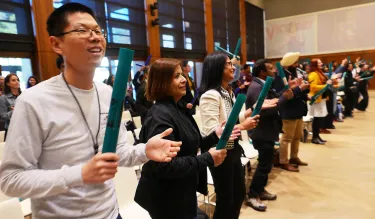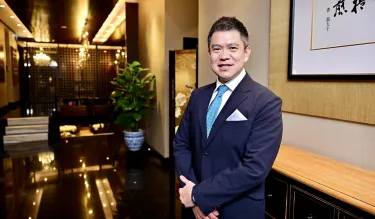Bringing Home U.S. Military Veterans Missing in Action
Retired Major Derek Abbey, USMC, is on a mission to repatriate the remains of soldiers lost in war. Project Recover searches by land and sea to find and honor American heroes.
August 31, 2023

Derek Abbey put on his diving suit and prepared for one of the most important missions of his career.
A U.S. Marine Corps officer, Derek served in VMFA-121, a Marine Fighter Attack Squadron known as the Green Knights. He had just returned from deployment to the Middle East and went on leave for a different kind of mission: Locate a Marine from his same squadron — missing from a WWII battle 70 years earlier.
Derek was embarking on his first volunteer missing in action (MIA) search mission with what was then known as the BentProp Project. The group was searching the islands of Palau in the western Pacific for downed military aircraft and the remains of soldiers MIA.
“We were combing the jungles and waters looking for lost aviators and others,” Derek recalls. “My first mission included my first MIA discovery.” Derek and team located an MIA-connected aircraft. A special twist in this case was the aviator was a World War II member of the squadron Derek was a part of. Finding an MIA, he says, means providing the person’s family with answers to long-held questions about what actually happened to their loved one.
“The impact of locating a crash site is incredible to witness, and it truly gives you purpose,” Derek recalls. “I wanted to strive to have more of an impact for our veterans, their families, and our nation. From that moment, I was hooked.”
The mission: Bring more MIAs home
Derek retired from the U.S. Marine Corps in 2014. He built a second successful career in academia, advocating for military members through student services and nonprofit programs. He continued to volunteer as a leader on missions to locate and recover MIAs.
In 2019, Derek became president and CEO of the organization, now known as Project Recover. Their slogan: “Their final mission. Our only mission.”
Over three decades, the program has worked with the Defense POW/MIA Accounting Agency to repatriate more than 17 MIAs and locate more than 65 WWII aircraft, leading 75+ missions in more than 20 countries. The organization works with the Scripps Institution of Oceanography and the University of Delaware, combining the power of science and technology with the drive of team members to locate crash sites and recover fallen service members.
Derek had earned a master’s degree in higher education leadership and was pursuing his doctorate in leadership studies before he took the helm at Project Recover. Interest from MIA families, supporters, and the general public has grown over the years.
“My intention is to continue scaling so that we can do up to 30 missions a year all over the world,” he says. “That’s really, really important, because time is not our friend when it comes to locating these sites and getting these individuals back to their families.”
Derek wanted to learn how to scale his organization and expand its recovery operations. “I needed some professional education and personal development to make sure that I’m the best instrument possible,” Derek says. “That’s when I discovered the Stanford program.”
Scaling up recovery operations
Derek enrolled in the one-week, on-campus program Executive Program for Nonprofit Leaders. “I felt it was important to challenge my own thinking, given the organization was very different than the smaller one from a few years ago,” Derek reflects. “We wanted to scale our scope and our missions. But when you scale an organization, it becomes something different. How could we ensure we were all rowing in the same direction?”
The program offers lectures, discussions, and exercises led by Stanford MBA faculty, designed to give participants a richer understanding of how to integrate organizational mission and strategy, along with a new perspective on their organization’s potential and impact.
Derek says working through case studies with other nonprofit professionals helped him gain valuable insights. “I’m a big fan of learning vicariously through other people’s mistakes instead of having my own,” he laughs. “I enjoyed working with other people on problems they may have already addressed, taking their learning points, and applying them.” He stays in touch with members of his cohort, appreciating the “connections across our organizations where we can reach back out and find or offer assistance.”
He continues to refer to what he learned at Stanford, as Project Recover scales to a continuously active, worldwide operation. “At least once a day something comes up that I think, ‘Ooh, this was touched on in the program,’ and I need to keep this at the forefront of my mind as we’re addressing whatever issue happens.”
Thanks to Derek’s vision and leadership, Project Recover has gained more exposure and support. They have over 100 MIA recovery missions pending, with 700+ cases in a growing database. “This is a humanitarian mission,” Derek shares. “Watching families and the community come together when a loved one is repatriated is just incredible. We won’t stop until our mission is complete.”
Explore More Stories
Strategic (Re)Thinking: Is Your Approach to Organizational Strategy Holding You Back?

Inspiring Change: An Insider’s Look at LEAD Me2We

Giving Ex-Offenders a Second Chance at Life
